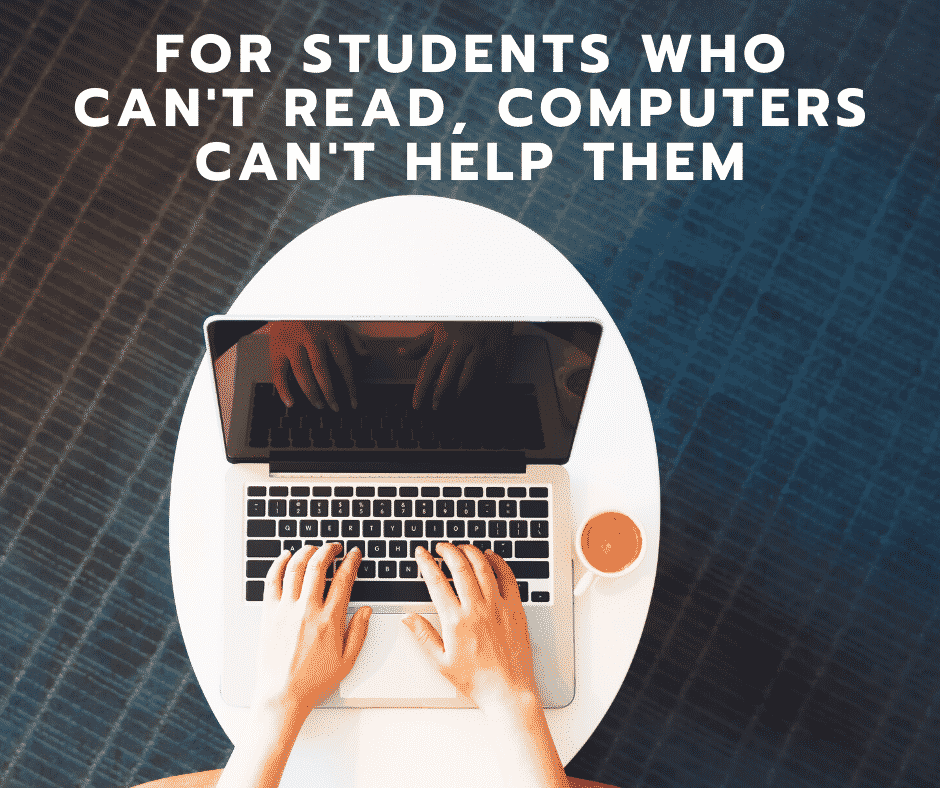Jason in my 2nd-period class can’t read. He decodes one-syllable words alright, but anything more, he won’t get.
Maureen in period 10, she can read. Ask her a question about what she just read and she will stare blankly back at you.
Javier is in my 5th period, I’m not sure about hi. He has never spoken to me, doesn’t look at me or acknowledge I exist when I bend down to talk. He doesn’t write on his papers. I don’t think he understands much English.
Teachers know the Jasons, and Maureens, and Javiers need attention and assistance. They know these kids need individualized instruction, more time, and fewer academic standards jammed into their school year. Yet, every minute of every day is packed. Teachers have long lobbied for changes, but public education remains the one service we have that is designed to care for people yet affords no time for individual attention. Providing resources to help kids has always been an uphill battle.
Knowing all of this, one can imagine my shock as school systems and federal policy makers have hastened spending and distribution of computers as well as internet services as though they are doling out candy. If a student needs a computer, it is an academic existential threat. But, when a kid can’t read, the norm is: tomorrow, maybe?
As COVID-19 upends our world and interrupts daily routines, school has to go on. And, all of a sudden, there is a rush to provide resources to students. Distance learning requires a computer with internet access. Students need a thing, and they are getting it.
Meanwhile, years of teachers asking for more human resources, services, and schedules to accommodate the needs of students have fallen on deaf ears. The costs are too high. The outcomes of such spending are too uncertain. Yet, in a matter of weeks, we have agreed to spend millions across the country to buy computers and set up expanded internet services for students.
There seems to be a perpetual belief in things over people in education. If we have the right curricula, kids will thrive. If the standards are clear and explicit, students will grow. If the screens are bright enough, learning will blossom. This is not to say that materials and curriculum guides are without merit; they have their place. But, when a crisis hits, it would be better if we weren’t scrambling to catch up after years of neglect. Every year, the talk in school houses is about being more efficient in long-range and short-range planning, improving assessment, giving better feedback, more practice, more precise grading, etc. It’s neglect by drowning. Teachers, students, and building-level administrators are habitually asked to do more.
Imagine if instead of worrying about all of the things we needed for Jason, we worried about Jason and the things he needed. Suppose when Jason’s 1st-grade teacher saw he was not progressing as quickly as his classmates, he started receiving multiple small groups and individual reading services each week. Or, what if his 6th-grade teacher had enough time to figure out–in weeks as opposed to months–that he had become withdrawn from the class, refusing to read aloud because he couldn’t see the board and needed glasses. After years of providing what Jason needed, there would be a lot less consternation about how a crisis would harm him. We could take solace in knowing that we spent years listening and reacting to Jason’s needs, which inevitably would translate into a quicker, less disruptive transition in an emergency.
It can be this way.
[bctt tweet=”COVID-19 has not caused problems as much as it has revealed them. ” username=””]
COVID-19 has not caused problems as much as it has revealed them. This virus is changing our behaviors today, and it will change our lives forever. We have control over how our lives and public schools will be shaped, but we can’t change the past. The research is clear and consistent. If we want to change students’ trajectories, the key is strong teachers. Study after study confirms this, yet when it comes time to spend dollars on more teachers and providing teachers with more time, we balk. As we watch, there is no hesitation to pour money into machines that are far less tested when it comes to educating students. It is an excuse that more robust change can’t happen. Learning from this moment, let’s set a course so that when a student requires human intervention, our attitude is: right away!






